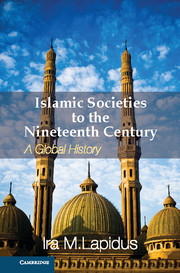Book contents
- Frontmatter
- Contents
- List of Illustrations
- List of Figures
- List of Maps
- List of Tables
- Preface
- Acknowledgments
- Acknowledgments to the first edition of A History of Islamic Societies
- Acknowledgments to the second edition of A History of Islamic Societies
- Publisher's Preface
- Introduction to Islamic Societies
- Part I The Beginnings of Islamic Civilizations
- The Middle East from c. 600 TO c. 1000
- The Preaching of Islam
- The Arab-Muslim Imperium (632–945)
- Cosmopolitan Islam: The Islam of The Imperial Elite
- Urban Islam: The Islam of Scholars and Holy Men
- Women, Families, and Communities
- Chapter 17 Muslim Urban Societies to the Tenth Century
- Chapter 18 The non-Muslim Minorities
- Chapter 19 Continuity and Change in the Historic Cultures of the Middle East
- Part II From Islamic Community to Islamic Society
- Part III The Global Expansion of Islam from the Seventh to the Nineteenth Centuries
- Glossary
- Bibliography
- Annotated Bibliography from A History of Islamic Societies, 2nd Edition
- Index
Chapter 19 - Continuity and Change in the Historic Cultures of the Middle East
Published online by Cambridge University Press: 05 February 2013
- Frontmatter
- Contents
- List of Illustrations
- List of Figures
- List of Maps
- List of Tables
- Preface
- Acknowledgments
- Acknowledgments to the first edition of A History of Islamic Societies
- Acknowledgments to the second edition of A History of Islamic Societies
- Publisher's Preface
- Introduction to Islamic Societies
- Part I The Beginnings of Islamic Civilizations
- The Middle East from c. 600 TO c. 1000
- The Preaching of Islam
- The Arab-Muslim Imperium (632–945)
- Cosmopolitan Islam: The Islam of The Imperial Elite
- Urban Islam: The Islam of Scholars and Holy Men
- Women, Families, and Communities
- Chapter 17 Muslim Urban Societies to the Tenth Century
- Chapter 18 The non-Muslim Minorities
- Chapter 19 Continuity and Change in the Historic Cultures of the Middle East
- Part II From Islamic Community to Islamic Society
- Part III The Global Expansion of Islam from the Seventh to the Nineteenth Centuries
- Glossary
- Bibliography
- Annotated Bibliography from A History of Islamic Societies, 2nd Edition
- Index
Summary
In the first part of this book we reviewed the beginnings and early development of Islam and attempted to show how early Islam was a part and continuation of late antique Greco-Roman and Persian civilizations. Islam goes back to the Prophet Muhammad, the revelation of the Quran, and the first Muslim communities in Mecca and Medina, but the Islamic religion was the amplification of these teachings, carried out in later centuries, not only in the original home of Islam in Arabia but throughout the whole of the vast region from Spain to Inner Asia conquered by the Arab-Muslims. The Islamic religion came to encompass not only the Quran and the example of Muhammad but a vastly expanded range of religious literatures and practices, including law, theology, and mysticism, developed in numerous schools and subcommunities. Islam in this sense refers to the whole panoply of religious concepts and practices through which the original inspiration was later expressed. Similarly, Islamic-era philosophy, poetry and belles lettres, arts, and sciences were also continuations of both the Arabian and the broader regional cultures of late antiquity. In this larger body of literature, arts, and sciences, religious and nonreligious influences intermingled. Islamic political, economic, and social institutions were also built on the same template as those of past empires, economies, and societies.
The appropriation of the past was in part unconscious and in part deliberate. The vast reach of the Islamic empires, the broad recruitment of the imperial elite, and the cosmopolitan quality of Baghdad brought the whole of the ancient Middle Eastern heritage into the purview of Islam. The new elites were impelled to generate a unified culture to provide a coherent way of life in their melting-pot cities, to integrate the disparate elements of the new elite, and to articulate the triumph, the legitimacy, and the permanence of the new order. These needs could only be fulfilled by the assimilation of the crucial elements of the ancient heritage.
- Type
- Chapter
- Information
- Islamic Societies to the Nineteenth CenturyA Global History, pp. 211 - 222Publisher: Cambridge University PressPrint publication year: 2012



